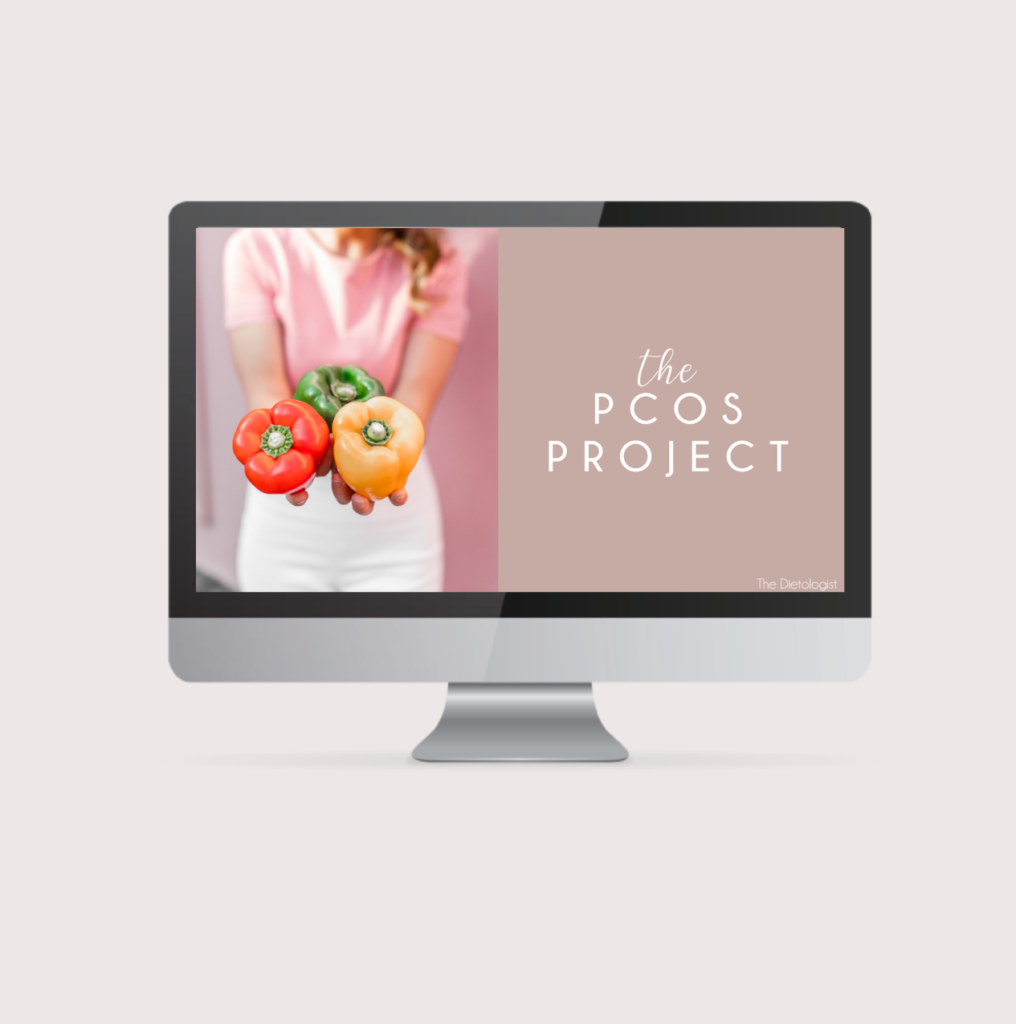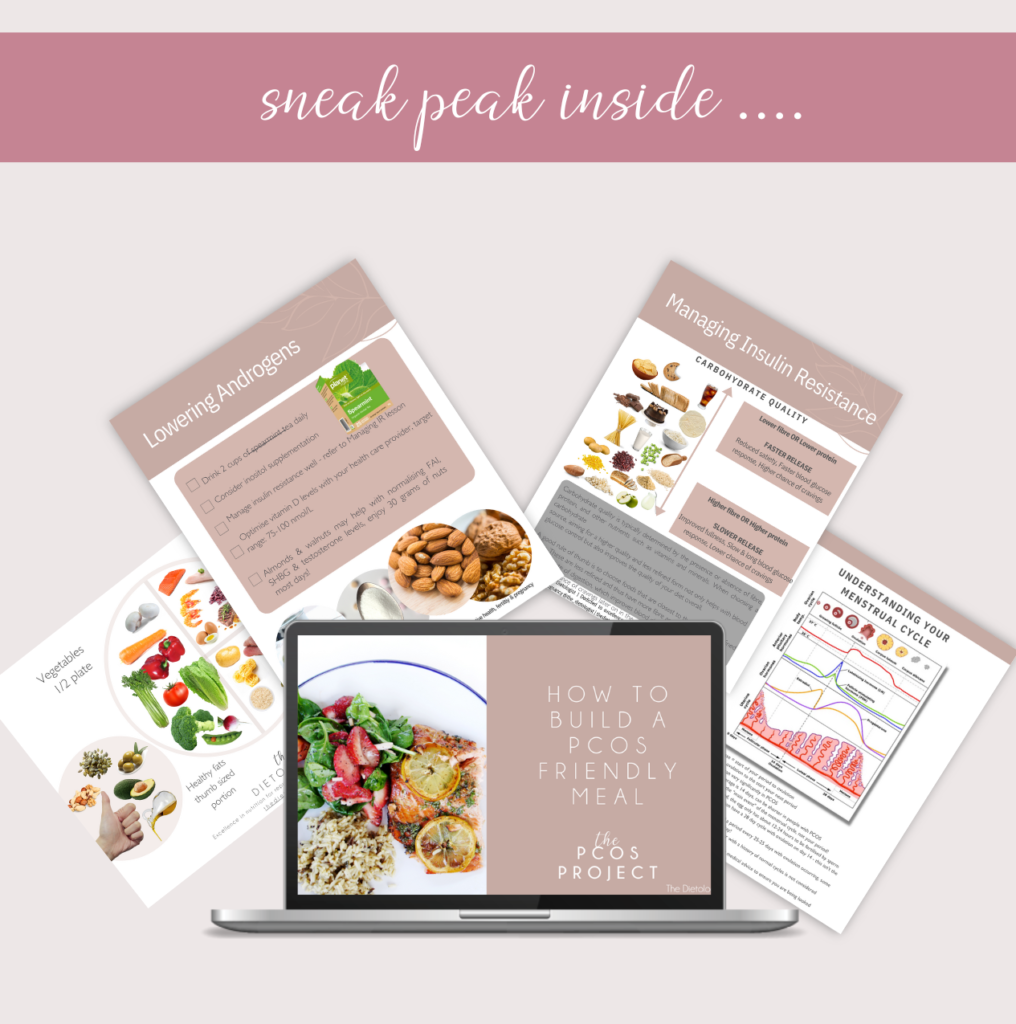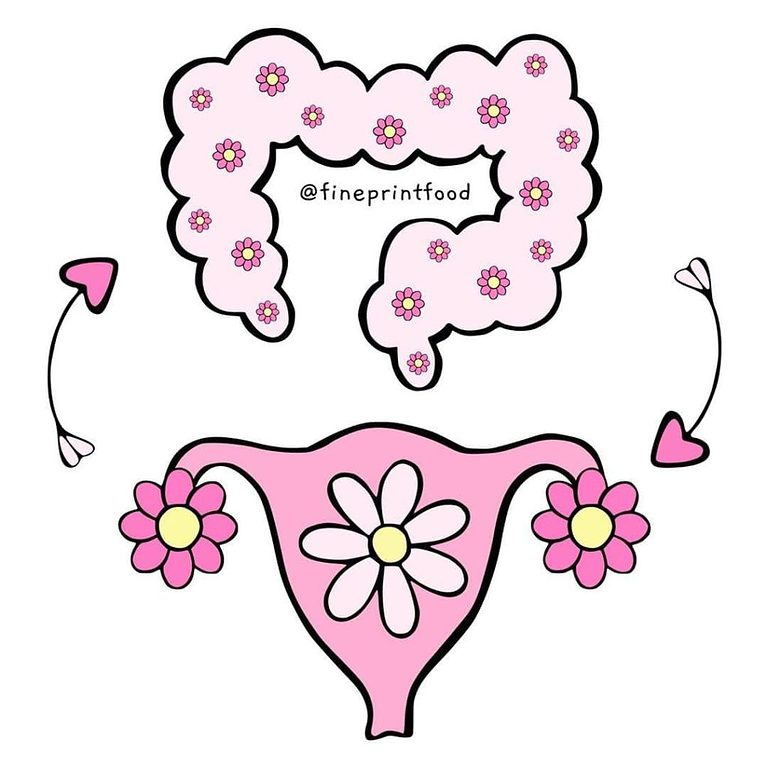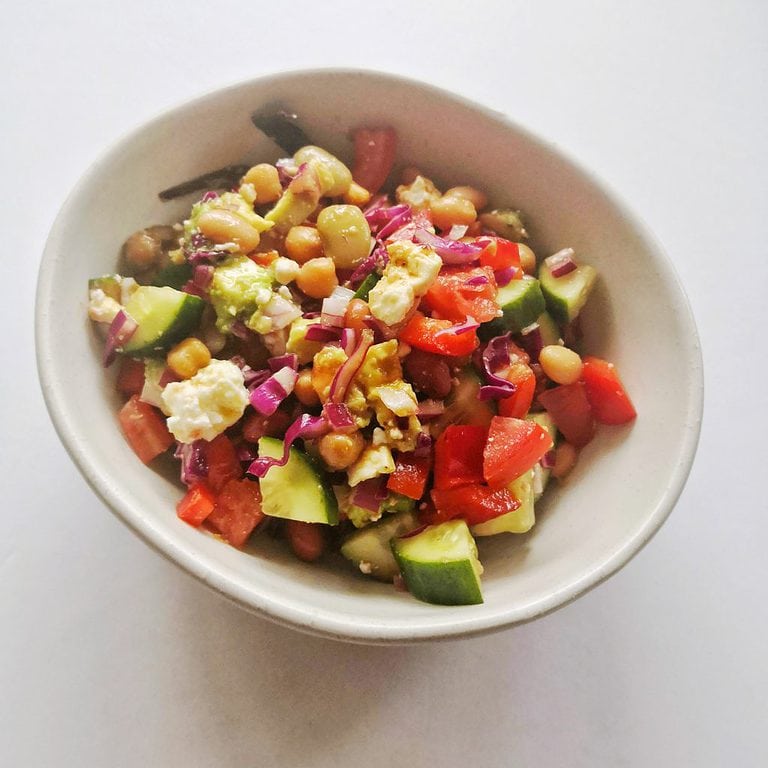PCOS is one of the most common reproductive conditions that affects females of reproductive age and is one of the most common concerns we see at The Dietologist too.
PCOS affects about 8-13% of females of reproductive age and as many as 70% of these remain undiagnosed (RACGP, PCOS, 2012).
PCOS stands for Polycystic Ovary Syndrome, it is a collection of symptoms that really is a hormonal disturbance, it is often oversimplified but it is actually quite a complex condition and in fact, has NOTHING to do with ovarian cysts at all.
WHAT ARE THE CRITERIA FOR A PCOS DIAGNOSIS?
The criteria for diagnosis are known as the Rotterdam criteria. You need to fulfil 2 out of 3 of the following to be officially diagnosed with PCOS. There is no single test that tells you that you are positive for PCOS, it is a collection of different factors.
- Irregular menstrual cycles – usually periods that are further apart by 35 days or more, consistently
- Biochemical evidence of high androgens (a blood test) or Symptom-based evidence (acne or hair loss or hair growth) of high androgens
- A polycystic appearance of the ovaries on a pelvic ultrasound. This actually refers to having a high number of immature follicles (which will potentially become eggs) on an ultrasound scan. These are not actually cysts, which are often mislabelled when having PCOS.
COMMON SYMPTOMS OF PCOS ARE:
- Irregular menstrual cycles and delays in ovulation
- Amenorrhoea (absence of periods) – some women with PCOS do not menstruate, in some cases for many years
- Excessive facial or body hair growth (or both)
- Acne
- Scalp hair loss
- Delays to conceiving (difficulty in becoming pregnant) – related to less frequent or absent ovulation
- Mood changes – including anxiety and depression
- Difficult losing weight
- Sleep apnoea

Note: You don’t have to have all of these symptoms to have PCOS.
Or you can read about lean PCOS here on our blog
COMMON MANAGEMENT STRATEGIES FOR PCOS
- The Contraceptive Pill – which encourages the shedding of the uterus lining. This is obviously not relevant if you are looking to conceive and want to get on top of your period regulation, and can just give you a sense of having a regular “period” but it’s just a withdrawal bleed (Monash International PCOS Guideline, 2018). When you stop the pill, all your symptoms will still be there to work on! So being proactive is key.
- Insulin sensitising strategies – typically a prescription for metformin or similar, a medication that helps with insulin resistance management can be made by your doctor. Regulation of insulin resistance can help with some of the symptoms of PCOS including ovulation, androgenic symptoms and may help with weight loss (Hahn et al., 2004).
- Medications to help with hair growth such as spironolactone are used to block the effects of androgens on the hair follicles to treat hirsutism (excessive hair growth like hair growing on your chin, neck, upper lip, back, upper arms or belly).
- Lifestyle support – dietary changes, physical activity and reducing your exposure to endocrine-disrupting chemicals can help. More on this within our previous articles here. And of course our PCOS mini-series over on our podcast, Fertility Friendly Food.
- Weight reduction – Reducing body fat can help reduce excess hormone production, especially estrogen, which excess adipose tissue can produce in the body. As dietitians who work extensively in this space, we know this is much easier said than done! Often people with PCOS are frustrated with being told to lose weight and need guidance and support to make meaningful changes to their health and lifestyle in a more nuanced way than “just lose weight”.
SO, WHAT ARE ANDROGENS?
Androgens are a group of sex hormones, they’re typically understood to be “testosterone”, but there is certainly more than just testosterone (Better Health). It is important to remember that people of all genders have androgens just some make more than others!
In the female reproductive system, the ovaries are responsible for making androgens alongside the adrenal glands, which sit on top of the kidneys. Androgens have an essential role in females, androgens can be converted to estradiol (a form of estrogen) which helps regulate menstruation, aids conception & pregnancy prevents bone loss and stimulates normal pubertal development (Clue).
Androgens naturally peak around the time of ovulation in a normal menstrual cycle, and can help contribute to an increase in libido around this time to aid with conception too! However, excess androgens can contribute to symptoms of acne, hair growth and hair loss, which some people with PCOS experience.
It can also contribute to the follicles in the ovaries not quite developing into a dominant follicle and contributing to that “polycystic appearance” on pelvic ultrasound, they aren’t actually cysts remember, they’re eggs in waiting!

HOW DO YOU KNOW YOUR ANDROGENS ARE A PROBLEM FOR YOUR PCOS?
There are two main ways to know if your androgens are a problem with your PCOS
- Blood tests – often called an androgen panel, there is usually dysfunction in these levels specifically free testosterone, free androgen index (FAI) and Sex Hormone Binding Globulin (SHBG). Speak to your doctor about getting these tests arranged and what might be relevant to you.
- Symptoms to look out for: acne, hair growth in places such as the chin, upper lip, back, tummy (snail trail) or elsewhere. This one can be tough depending on your ethnicity as well! Hair loss from your head can also be another symptom. Also note, that hair loss can be a symptom of other health conditions such as hypothyroidism, alopecia and other concerns so make sure this is all ruled out appropriately!
HOW CAN I LOWER ANDROGENS NATURALLY?
Lowering androgens for PCOS usually involves a coordinated approach that targets insulin resistance and blood glucose levels as well as the androgens themselves. So, with that aside, here are a few quick tips to help reduce your androgens using food and nutrition. Get your notepad or note section on your phone ready
- Spearmint tea (not peppermint, not three mint, SPEARMINT!) – 2 cups per day has been researched to reduce total and free testosterone levels in those with PCOS, and within 30 days the participants found a significant reduction in hair growth! (Grant, 2010). A much smaller study of 12 people with PCOS over 5 days were given 2 cups of spearmint tea during the follicular phase of the menstrual cycle, testosterone levels were reduced! So it works pretty quick, and it’s a pretty cheap way to help your PCOS (Akdogan et al., 2007). Find 100% spearmint tea and 2 cups daily, either hot or cold – iced mint tea in the summer is delightful
- Improving blood glucose levels & insulin resistance management – high circulating insulin levels exacerbate ovarian dysfunction and interfere with androgens too, so it’s a bit of a vicious cycle, so getting your blood glucose management under wraps with dietary management and exercise and other strategies, a moderate carbohydrate diet with a focus on slow-release or low GI carbs can be a helpful start. One study showed that enhanced BGL management can improve testosterone levels! Read more about Managing Insulin Resistance Here.
- Flaxseeds – about 30 grams of ground flaxseeds (stick them in the fridge to protect the fats from going rancid) may help with hormone profile in PCOS, especially in the luteal phase (Nowak et al., 2007; Haidari et al., 2020).
- Omega-3s – boost them! You already know I am obsessed with oily fish and omega-3s, but boosting your healthy fats from fish like salmon, ocean trout, mackerel, sardines & anchovies at least twice per week for a benefit, studies have been conducted using supplements and it has shown that testosterone concentration reduces in the omega-3 group (Nadjarzadeh et al., 2013).
- Nuts – especially walnuts can help boost SHBG and thus helps reduce androgen levels, you will need about 30 grams of nuts daily to see a benefit! (Kalgaonkar, et al., 2010).
- Vitamin D – supplementing with Vitamin D to ensure adequate vitamin D levels (always check with a blood test before considering supplementation! There is a small risk of vitamin D toxicity as it is a fat-soluble vitamin) may also help manage testosterone levels (Al-Bayyari, et al., 2021).
- Inositol – studies of supplement inositol, a B-vitamin-like nutrient, can help enhance insulin resistance management and BGLs, and studies have shown that it may help reduce testosterone, alongside many others (Unfer et al., 2017). Read more about Inositol for PCOS here.

And don’t forget, getting enough sleep, managing stress, and exercising – especially muscle strengthening and resistance-based training like weights – are particularly helpful in the management of PCOS alongside the above to help reduce androgens too!
Introducing…The PCOS Project

This self-paced online course has been developed to highlight the role of diet and nutrition in managing your PCOS symptoms and taking control of the rollercoaster that is PCOS with 10 comprehensive PCOS-specific nutrition lessons. We also include BONUS PCOS-friendly 7-day meal plans and recipes! Check it out ?

What you’ll get inside The PCOS Project:
- Over 10 comprehensive PCOS-specific nutrition lessons designed & delivered by expert reproductive health dietitian & nutritionist
- Learn exactly what bloodwork you need to monitor your PCOS today and in the long-term too!
- Take control of insulin resistance and stubborn weight using the insulin resistance lesson & comprehensive workbook
- Our strategies to lower androgens driving those pesky pimples & chin hairs!
- Understand your menstrual cycle, the ways you can track it, what the “red flags” are for more help and how to nourish yourself for more regular periods!
- PLUS: supplementation considerations for PCOS (note: does not include personalised supplementary advice), mood & food for mental health, anti-inflammatory eating for PCOS, optimising gut health & how to build a PCOS-friendly meal
BONUS: PCOS-friendly done-for-you 7-day meal plans with recipes AND additional recipe resources!
You will get 2 YEARS to access this incredible VAULT of expertly crafted & delivered PCOS education.







